You can listen to the podcast on this simple landing page: https://share.transistor.fm/s/a2b3ea54
You can download the mp3 file here: https://media.transistor.fm/862d207c.mp3
Transcript of Episode 5: ON HAPPINESS with Professor Tim Kasser and Dasho Karma Ura.
Tanya’s Voice:
Welcome to Nordic By Nature, a podcast inspired by the Norwegian Philosopher Arne Naess, who coined the term Deep Ecology.
According to Naess’s interpretation of Spinoza, Happiness is best realised through living life to the full out “in the world”. Other philosophies suggest a life of contemplation is the path to enlightenment, the ultimate happiness. In a way it is this struggle to balance our inner values and desires with our external actions and reactions that makes the search for Happiness, an experiential process rather than a destination.
You will now hear from two guests who have dedicated their careers to understanding the relationship of values to our behaviour, and how our sense of wellbeing has a direct impact the wider world around us.
First, you will hear from Tim Kasser, currently a professor of psychology at Knox College in Galesburg, Illinois, USA. He has performed extensive research on materialism, values, well-being, and environmental sustainability, among other topics. In 2018, he collaborated with the cartoonist Larry Gonick to create a graphic book, HyperCapitalism: The modern economy, its values, and how to change them.
Then you will hear Dr. Karma Ura, President of the Centre for Bhutan & Gross National Happiness Studies located in Bhutan’s capital city, Thimphu. The Centre has a mandate to research Bhutan’s Gross National Happiness, Culture and History of Bhutan, and policy related studies.
Gross National Happiness offers a framework of criteria for policymaking and all kinds of human activity, including that of companies and corporations.
TIM KASSER: 22.49 mins total
So, my name is Tim Kasser. I’m Professor of Psychology at Knox College which is in Galesburg Illinois in the United States. And I’ve been studying people’s values and goals and how they relate to well-being and ecological damage and other kinds of things for about 30 years now.
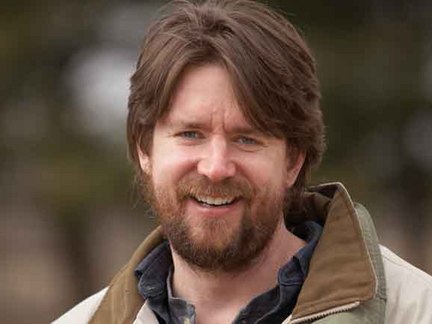
Professor Tim Kasser
At the time that I started to move into the ecological work, I had already been doing a lot of work on people’s values and goals and how they related to their own personal well-being, as well as to some social outcomes. And then a guy named Kirk Brown actually approached me and said “Well what about ecological stuff?”
And so we did a study together right around the year 2000 actually where we began to look at how people’s values and goals related to ecological outcomes, so people’s ecological footprints and their ecological attitudes and behaviours. That really sparked my interest and so I started to do more work in that realm.
From a psychology’s perspective there’s all this focus on well-being but pretty much the focus is on how happy is this person, how not depressed is that person, how you know satisfied with life is this person.
But there’s relatively little comparatively about well-being involves living well in a way that doesn’t damage other people’s opportunity to live well and doesn’t damage other species opportunities to live well and doesn’t damage future generations opportunities to live well.
If we really want to understand well-being, we have to get beyond I guess what you would call the user there or what the psychologist would talk about with regard to personal well-being. And we really need to focus on social and psychological well-being as well. 1.51
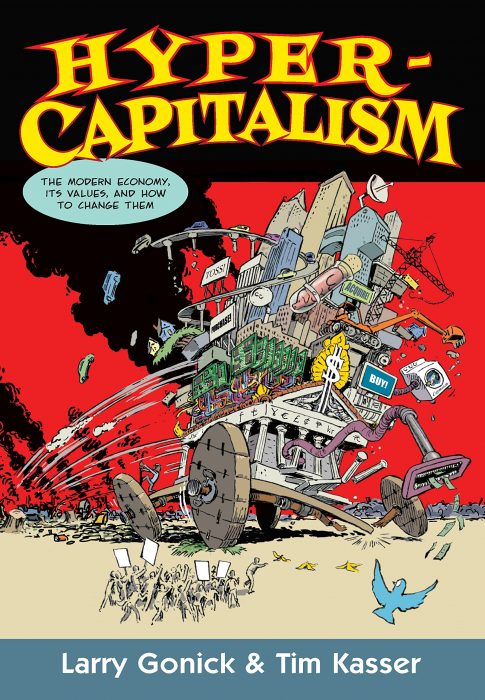
Hypercapitalism: The Modern Economy, Its Values, and How to Change Them
One of the major things that you would hear from politicians and others was that we can’t focus too much on the environment because that will decrease people’s well-being because they’ll have to give up X and give up y and give up Z.
And so, what we really tried to do, and we were I think the first people to do was to set out to test that idea. So, is it the case that psychological well-being and ecological well-being are incompatible, or might they actually be compatible?
And so in two studies we measured people’s personal well-being so their life satisfaction their experience of pleasant and unpleasant emotions. And then we also measured their ecological footprints and their ecological attitudes and behaviours and what we found was that actually in both samples personal and ecological well-being were positively correlated. That is, happier people tended to also be living more ecologically sustainable lifestyles.
And I’d say a little bit more about that finding from the Brown Kasser study, but I want to note that two years ago I did a summary of the literature on that, and it turns out that that finding that personal well-being and ecological well-being are positively associated has now been replicated about 15 or 20 times in other samples, cross culturally, with lots of different kinds of measures of well-being, with lots of different ways of measuring environmental behaviour as well.
So, it does seem to be a rather robust relationship that Kirk and I discovered back in 2000.
The other thing that Kirk and I were interested in is what is it that allows personal and ecological well-being to be positively correlated.
What were the psychological mechanisms, if you will, which allow those two things to go in concert with each other.
We looked at three different possibilities all of which had some data to support them. So the first one which was the thing I’d been studying for quite a while was people’s values and what we found was that part of why people who are happy are also living more sustainably is that they focus on values for their own personal growth and their own connection to other people and helping the world.
And they focus less on values like making a lot of money having a lot of possessions having the right image being popular. All those values and encouraged by consumer capitalism. So, one of the reasons that people can be both happy and sustainable is if their values orient them in a certain way.
The natural outcome of a focus on those intrinsic value is we call them instead of the materialistic values is to be happy in the moment, is to live more sustainably.
On Mindfulness
A variable that Kirk had been studying for some time, which is called mindfulness. And so, Kirk was one of the early people in psychology to really look at mindfulness, which is the ability to be with one’s thoughts in the moment in a non-judgemental way.
And so again what we found was that people who were more mindful were also living more sustainably and happier at the same time. So, there’s something about mindfulness which conduces towards both of those kinds of wellbeing outcomes.

Hyper Captialism book illustration
On Lifestyle
And then the third thing we looked at was lifestyle, so probably heard of the idea of downshifting or voluntary simplicity where people decide that they’re going to no longer kind of buy into the normal work and spend lifestyle but instead live a simpler life. And so, in our study we had 400 people 200 of whom were simplify hours and 200 of whom were mainstream Americans. And again, what we found was that those who were voluntary simplify hours were more likely to be both happy and to be living more sustainably.
Now that was actually the weakest of the three factors compared to mindfulness and values but it certainly did seem to matter. So that was essentially what we found and for us that’s a pretty hopeful message because what it suggests is there are things people can do in their own lives their lifestyles with their values with their mental practices which can conducive towards both happiness and sustainability.
And it shows that all those messages telling us that you know we have to sacrifice and give stuff up and that’s going to in order to have a sustainable world that that’s actually doesn’t appear to be true. 6.22
And that’s one of the things we found actually was that all three of those variables we were just talking about were kind of related to each other so people who were more mindful tended to have more intrinsic values and to be less materialistic. And people who were voluntarily simplifying their lives also tended to have more intrinsic values and to be less materialistic.
There’s kind of a grouping of a way of life if you will that I think kind of stems from what people think is important or what people think is not so important that can then lead us to practice our lives in certain ways to make certain choices, which have these real important consequences for people’s own personal well-being, but also for how they treat other people and the planet.
On Intrinsic Values and Nature
The intrinsic values or values for things like your own personal growth for family and for helping the world be a better place. The extrinsic materialistic values are things for money, image, status. And one of the things that we’ve learned in the last 10 or 12 years about those values, is that they stand in a dynamic opposition with each other. They’re in a kind of a tension with each other.
I’ve used the metaphor for a lot of years of a seesaw. You know that children’s playground you know you sit on it one then goes up in the other and goes down. Well the same happens with these values. The more the people focus on those intrinsic values, the less they tend to care about the materialistic values, but the more they care about materialistic values the less they care about the intrinsic values.
So one of the things that we’ve done a lot over the last few years is to do studies where we activate momentarily in people’s minds one or another set of values, and then we see what happens to the other values. So, if we get you thinking about money for example what the research shows is that you’ll care more about money related things and image related things and you will care less about helping other people. But if we get to thinking about intrinsic values, momentarily, then you’ll care about more things like the environment and helping other people, and you’ll care less about things like money and status and power.
What research suggests is that an awareness of nature, probably be one way of activating those intrinsic values of building up that part of the human value system, and getting people more and more focussed on intrinsic values, which is good in and of itself, but it’s also good because what it will do will be to suppress those more materialistic values, because of the way that the human value system is organised.
As you get people thinking about nature and being more and more aware and caring about nature that’s going to build up the intrinsic values which will then suppress the more materialistic values.
And there’s research which actually supports this. There was a study by Neta Weinstein, she exposed people to pictures of nature or pictures of manmade things human made things.
And then she measured how immersed people became in those pictures and then she measured their values afterwards and what she found was that if you gave people pictures of nature and the people became immersed in those then what happened was their intrinsic values went up and they’re materialistic values went down compared to if you showed them pictures of nature and they didn’t get immersed or if you showed them pictures of human made objects.
That makes perfect sense from the value research that we’ve done because essentially she’s kind of activated those more intrinsic values which is going to suppress the more materialistic values.
On WWF Scotland research
WWF Scotland probably 10 or 12 years ago did something called I think was called the Natural Change Project.
There were a lot of different elements to that project but essentially what they did was they found a bunch of kind of leaders in the business political artistic world who didn’t seem actually to care very much about it’s not that they dissed nature or didn’t care about nature but like their lives weren’t organised around trying to improve the environment.
That’s not what they were up to. That wasn’t their main gig. And so for over the next six months or a year or so like that they took these individuals and they did a whole variety of deep eco psychology kinds of interventions which if memory serves culminated with a dawn to dusk so low sitting time in wild nature so people would go out and they would sit down in one spot and basically stay there until it got dark by themselves for you know 12 hours or whatever.
And you know if you read the reports that were coming out of that Natural Change Project and what you found was that as people were reflecting on what all of that experience meant to them they were starting to say it was exactly what we’ve just been talking about, which was that they saw that things like money and status and didn’t really matter to them so much more what they really were more focussed on was things like relationships and things like promoting the community, and things like sustainability.
And then we can expect that if we’ve really shifted people’s values that’s going to have impacts later on in terms of specific behaviours that they engage in for a long, long time.
On Business
We’ve got to intervene with businesses. You know I think there’s just no way around that. The issue of course is that if it’s a publicly traded for profit business, at least here in the United States, that means that it has to place shareholder value and profit as its primary concern.
And as we just talked about with regard to the value conflicts, the more that you’re focussed on profit, the less you’re going to care about the environment. And so when push comes to shove, if it’s about making a choice that helps the environment, or a choice that helps make profit, as long as you’re on this publicly traded for profit corporation model, you’re going to hit that barrier.
My recent book is called hyper capitalism the modern economy, its values and how to change them. It’s a cartoon book actually, and my co-author slash illustrator is a guy named Larry Gonic. Cartoon me is the narrator.
And you know at the beginning of that chapter on business it begins with me saying you know that I used to be very dubious about changes in business you know and I’d kind of given up on that. But I think at this point
I think there’s a lot of excitement in terms of what’s happening in the business arena. There’s a lot of interesting cool models out there about alternative ways to organise businesses so that you don’t hit that barrier around profit. You know so if you look at worker co-ops if you will look at benefit corporations if you look at all kinds of other models you can start to see ways in which big organisations and product can try to focus both on profit and on things like sustainability and social justice.
On Hypercapitalism
You know I think capitalism is a particular economic system and we could talk about what it entails. But I think what’s what happened after World War Two and then especially in the late 70s and early 80s in the in North America and in Europe was there was a real shift towards a more extreme form of capitalism than was in place before you know and I think that that’s when you have globalisation coming in that’s when you have much more pushes towards privatisation you see a huge rise in consumerism at that time because you’ve got kind of modern advertising coming out view all different sorts of media especially the television etc. and then you have a lot of deregulation which occurs in many of these countries as well where government steps back and says go at it business you know how to do whatever you can do to maximise economic growth. And so this fetishism of economic growth and of buying stuff and of moneymaking and profit and all the rest really began an era where I don’t think we were in capitalism anymore. I think we had moved on to a more extreme version of capitalism that by putting all of these materialistic values at the forefront began to suppress even more and more and more values like equality values like caring about the environment et cetera.
And indeed it’s around that time when you start to see work hours go back up you start to see indices of inequality go up you really start to see lack of movement on a lot of environmental issues etc. So. So that’s how we understand hyper capitalism to a term that’s been around invented by somebody else. But it definitely seems apt to start to talk about you know what is the political economic social system that we find ourselves under in much of the world at this point.
On Neoliberalism
If you take a look at neoliberalism its fundamental tenets are tenets of deregulation, privatisation, and globalisation. and that you need to have government back off you need to have things as globalised as possible in terms of production and sales, and you again need to get the government out of the law-making business as much as possible so not regulating businesses. And you need to turn over as many government functions as possible to the private sector supposedly because the private sectors motive for profit will make it more efficient and then give everybody better products and better services.
So I think, fundamentally that’s the idea of neoliberalism.
You know again a lot of that emerges out of the out of the post-World War Two destruction and the Cold War the rise of the Chicago school of thought with regard to economics in particular. I think when you really see it hit home is when Reagan and Thatcher are in charge, early 80s that’s when you start to see neoliberalism become dominant in lots and lots of ways. And that’s when you start to then see the expansion into a hyper capitalist society.
That’s the fundamental faith of neoliberalism, well you know that if you turn things over to the invisible hand of the free market and you get government out of the way then good things will happen to me that is the fundamental faith state of neoliberalism.
But I would argue it is a faith statement.
Don’t get me wrong. Capitalism has been remarkably successful in doing what it sets out to do which is to provide a whole lot of products at relatively cheap prices for a whole lot of people and to create a great deal of wealth by its own terms.
Capitalism has been remarkably successful but if you care about equality or if you care about sustainability or if you care about authenticity and well-being, which are things capitalism doesn’t claim to care about, by the way, then you have to really question capitalism.
And again, here’s where we’re back to that fundamental value dynamic. You know the more and more you focus your lives and organisations and society and political structures around maximising wealth and consumption you’ve activated and encouraged those extrinsic values.
And as a result, you care less and suppress those intrinsic values for things like equality and sustainability and all the rest.
If we can trust all of the data we’re getting we know that things are headed down the wrong road.
And so we can either throw up our hands or we can start to develop alternative models.
Well we have to do is to start developing those alternatives and really work on them and figure them out so that we can try to prevent the bad things from happening. If that’s still possible and if it’s not possible then when the bad things do happen, we can say ‘Hey try this, not that!’
Here is the place where I think that the Nordic nations and then the Northern European nations as well you know Denmark and the Netherlands and Germany have been real leaders, have really pushed to develop these alternative models, to develop alternative practices, to try to try to make some changes at a structural levels and in lifestyle levels, to show it’s possible. And again, I would go back to where we started our conversation a while back. What’s also fascinating is that those are some of the happiest nations in the world. You know so and you can argue about why that is, but that the fact remains that these nations that are moving in these more sustainable ways also in study after study, Denmark, Sweden, Norway and Finland, and the Netherlands, are oftentimes the among the happiest nations in the world.
It’s actually pretty short period of time that we’ve been under globalisation in the scope of human history, right? it’s been 40 years that’s a blip in this course of history.
When people focus on intrinsic values they focus less on materialistic values they’re happier they act in more pro social ways and they live in more ecologically sustainable ways.
Fundamentally at base the solution is actually fairly simple: How do we orient our personal lives our businesses our communities and our governments around intrinsic values rather than extrinsic values?
Because what all the evidence suggests is that if we can do that materialism will become less important people will be happier people will treat each other more nicely and people will treat the planet more nicely.
Now how to get from here to there is a different issue, but at least like with the thing that makes me optimistic is that there is a ‘there’ I can see. There is a ‘there’ that I can see and that I can understand and that makes sense theoretically from what I know as a psychologist. It has empirical data behind it. It actually is very consistent with almost every spiritual and philosophical tradition which has been around in the history of humanity. And there are people doing it now right. There are people who are living these ways now.
If any listener is out there who thinks these ideas are valid. I would encourage you to work at your city level first to get engaged in the city and try to change your city because I think that cities are where people live and so they. They have their experiences there and what happens at cities. If you can make something work at a city, it provides a model that you can say to another city or to a province or to the federal government ‘hey but it worked here, it worked here. Let’s try it at another place and try it in another place.”
Working at that local level is fundamental and our best shot.
End
SOUND BRIDGE TO KARMA URA:
Karma Ura’s Upbeat music. His own composition.
I am Karma Ura, and I’m presently the president of the Centre for Bhutan and Gross National Happiness Studies. It is an autonomous government sponsored think tank, and it is located in Thimpu, the capital of Bhutan.
We have mandate to conduct research on Gross National Happiness, policy background studies and culture.
My background is in economics and philosophy at the master’s level, and PhD in International Development. So, all of my professional life, for some 30 years now, has been devoted to Alternative Development, its indicators and statistics on one side, and Buddhist Philosophy, Literature and Fine Arts, on the other.
Incidentally, I am also a painter and I design artefacts and performances. For example, I designed the 1000 denomination currency for Bhutan. I have painted the murals of a whole temple, and designed a national festival which is held on the 13th December every year.
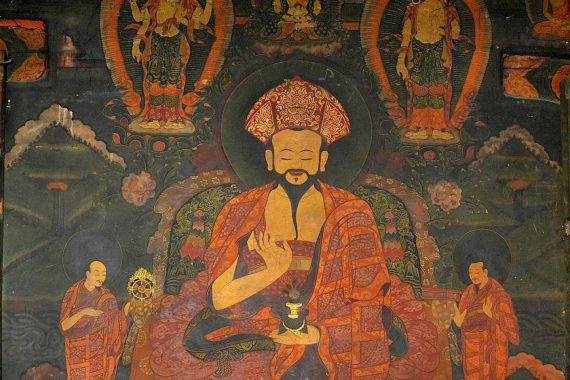
An 18th century mural of Zhabdrung Ngawang Namgyal (1594-1651), considered to be the architect of Bhutan.
On Development
The idea of development is usually introduced from outside. It is a frequently based on idea of industrialisation and an expansion of the economy.
Alternative development involves indigenous ideas about how we should transform our societies. If you have certain different ideas about transformation of society, along with different destination goals, that would qualify as alternative development.
Goal, in the context of Bhutan would be happiness of the people.
The goals of development in the case of Bhutan involves nine domains of Gross National Happiness.
Living standard is only one of the nine goals of development. The others are, Health, Education and Living standards; these are fairly well-known ones and followed everywhere else. Slightly new ones are Good Governance, Environment or Ecological Resilience, and Cultural Diversity and Resilience. So that comes to six domains. But the last three domains are on the frontier of development, and these are Psychological Well-being, Community Vitality and Balanced Time Use over 24 hours. We in Bhutan consider these 9 domains of Gross National Happiness as cause and conditions of happiness.
SOUND: 2. SINGING KIDS BHUTAN.wav
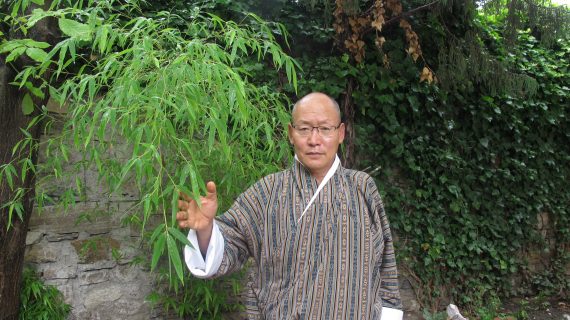
On Gross National Happiness- the background
It was first explicitly coined in 1979 by the fourth King of Bhutan, Jigme Singye Wangchuck.
For some time, GNH was realised through legislation and policies of the government, led by him. But In 2008 Bhutan became a parliamentary democracy.
Since then governments have been elected through universal franchise, as you know. Constitution was also adopted, and the constitution obliges the government to pursue a quantitative framework of Gross National Happiness, to guide politicians and bureaucrats to the long-term goals of Gross National Happiness.
In 2006, we adopted the concept of nine domains of Gross National Happiness, and along with it, we were directed by the fifth King of Bhutan to create Gross National Happiness Index. Since then we have had a quantitative framework of Gross National Happiness.
Measuring Happiness?
I think we have to be clear, when we talk about happiness, about how its measurement is laid out, what it measures, and on what the comparative ranking of the nations are based. As you know very well, the Nordic countries come on top in the ranking based on subjective well-being. We need to clarify a lot about international comparison and ranking of nations with regard to happiness. The World Happiness Report, I would like to emphasise, is based on a very narrow measurement of happiness to build international ranking.
Ours is much comprehensive and broader, much more probing about reality, and what human beings are. They need not just income. They need to simultaneously many other aspects included in the nine domains of Gross National Happiness.
In ecological terms the leadership and achievement of Bhutan is quite significant in the world.
Amongst the nine domains of Gross National Happiness, one of them is Ecological Diversity and Resilience. And government of Bhutan has been led by the leadership of the Kings to maintain a very high environmental quality, so that people’s welfare, which is dependent intimately with the quality of the environment, is very high. The contributions of Bhutan to the global climate change and environment or positive vision is unusually high.
At the moment 72 percent of the surface area of Bhutan is forest covered. 52 percent of the country is preserved as protected nature. Bhutan is carbon negative. Most of its energy is supplied by hydroelectricity. So it is green energy. People in their daily life has access to nature.
I think sometimes size and scale impresses people. But the aims that are enshrined the United Nations Global Assessment Report released on 6th May 2019, are all met by Bhutan.
All its ideals, all its goals would have been met by Bhutan in the field of environment, climate change and biodiversity. But Bhutan is small to have a global impact. Nevertheless, what it does on a per capita basis is extremely outstanding.
Bhutan as a country has taken extraordinary burden for the sake of global climate and biodiversity.
SOUND: Bells and Nuns-of-bhutan.wav
Nine domains of Gross National Happiness
The nine domains of Gross National Happiness are Psychological well-being, that is emotional and spiritual aspects of wellbeing. Community Vitality: since we are social by nature, companionship and good relations are at the forefront of well-being. Time use: that means nobody should run out of time to do things that are vital to well-being and happiness. We have to have some freedom over our own time over 24 hours.
Ecological Resilience and Diversity. Cultural Diversity and Resilience. Good Governance. Education, Health and Standard of Living. So, these adds up to the nine domains. I listed them separately but in reality, they are highly interdependent.
And so, it is important to see them in relation to each other rather than in isolation.
I think they – the nine domains – are relevant to any place where there are human beings and other sentient beings.
That would take us into the question of how the indicators are constructed and how the indicators are used as benchmark in national planning in Bhutan.
Poverty is minimal definition of well-being. It is a survival definition of well-being. It’s not really well-being. Happiness is a maximal concept of well-being. It is attainable and achievable.
In Bhutan you know the definition of happiness in terms of nine domains is related to measurement. We construct a single number GNH Index and 33 sub-indicators of GNH. Altogether we use about two hundred and thirty different variables to estimate the GNH index and its 33 sub-indicators. So now you can see the distinction of GNH measurement against poverty and subjective well-being. Both the latter measurements are based on a narrower measure of wellbeing.
To simplify things, if an individual were to achieve a perfect score in GNH index, he or she would have to have one hundred and thirty variables. And in these one hundred and thirty variables are drawn from nine domains of GNH.
I’m very familiar with the World Happiness Report because I am one of its council members. The United Nation’s World Happiness Report, first of all, is an outcome of a Bhutanese initiative. The Government of Bhutan organised a U.N. High Level Expert Meeting in April 2012, in the United Nations, in New York. it made two recommendations at that time. One was that governments around the world should make Happiness and Well-being a focus of their public policy. That was the first recommendation. And the second one was that the United Nations should declare our World Happiness Day. So, both were implemented.
Now as a result of this high-level meeting in the United Nations, World Happiness Report came into being, led by John Helliwell and Jeffrey Sachs.
From measuring to policymaking
One of the characteristics of the GNH index, and its 33 sub indicators, is that It can be disaggregated at any level to the nth variable and nth individual. You can disaggregate the achievements across all domains, demographic variables or gender.
This enables us to then see by using GNH indicators as a sort of lens, where and whether there is a gender difference or discrepancy, or age specific discrepancies, geography specific discrepancies. Theses can be picked up so neatly by the indicators which is based on a national survey conducted every four years.
Social and economic planning is done for five years at a time, so our Gross National Happiness survey is done in fourth year and the results are fed into the five-year plan as benchmarks, targets, and policy focus areas.
We can measure by experiential outcomes such as emotions, health and happiness scores etc. or you can measure by means to happiness.
In terms of happiness, I must say that there is a gender difference in outcome. Women in this country score slightly less though it is not very significant at 95 percent confidence. However, this distinction between men and women, in the attainment of happiness, disappears above 50. The performance on the happiness scale is lower for a woman, if we if we compare women and men below the age of 50.
The important thing to appreciate is that Reproductive Health is playing a negative role.Therefore, the government, taking this finding into account is strengthening maternity and child health. It gave a long maternity leave of one year, out of which 6 months is paid. We have only seven days of paternity leave here. The relegation of domestic chores to women and the social care burden which fall traditionally on women, is one of the big problems in Bhutan.
Introduction of cooking facilities and electricity should help resolve gender discrepancy. Electricity up to 100 units is free for rural areas. Education, health, and so many other essential things, such as water supply, are also free.
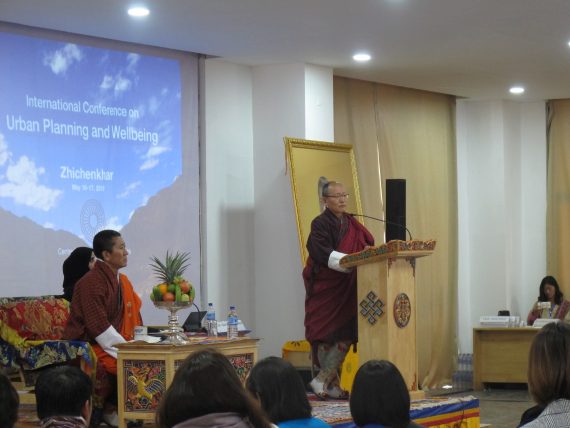
Karma Ura welcoming PM of Bhutan to an international conference at the Centre for Bhutan and GNH Studies.
SOUND BRIDGE: KARMA URA’S MUSIC
ON Gross National Happiness Business Certification
Bhutan is a country which escaped colonisation. And it’s one of the very few countries in the world to have been that fortunate.
This means that the continuity of ideas of what a nation should be, or what human beings aspires have not been smashed by any external ideas.
The continuity of institutions and ideas have been able to survive in this country. Bhutan has continued to be a Buddhist and ecological welfare state.
Because of its adherence to Buddhist welfare and ecological state, free market ideas cannot take complete dominance here. And that is why, the global corporations have not been able to intrude very much.
Bhutanese foreign direct investment rules are very strict. Environmental and cultural bars are very high here.
Those who are just hunting for profit cannot find it very easy to come into Bhutan.
Last year, at the direction of the Bhutanese government the Centre for Bhutan and GNH studies developed what you call GNH business certification.
This assessment will be applied to all corporations and businesses in future.
On evolving Corporate Social Responsibility
For a long time, Corporate Social Responsibility was the end all of business. But the shortcomings in CSR is that it does not require businesses much transparency in how they should make money. It is how they dispose a certain small proportion of the profit. After CSR, a new model of business is benefit corporation or B-corp in short. But GNH business certification is much more advanced in my opinion because it applies the nine domains to the workings of corporations in a very explicit way.
GNH index and 33 indicators is designed for governance purpose. For example, derived from Gross National Happiness’s nine domains is the GNH policy screening tool that the government applies to formulate and pass every policy of the government. For example, 15 policies have undergone GNH policy screening out of 22 policies so far. We will do similar assessment now to corporations by using GNH business certification.
As far as Europe is concerned, next year, in late March 2020, we will be having an international conference in Parma, Italy. One day out of three will be devoted to GNH and GNH business certification.

The Centre for Gross National Happiness and Cultural Studies, Bhutan.
On limits to growth
Bhutan also has a very modest tourism policy.
Foremost for us as a society is that nothing should step beyond our environmental-ecological capacity, and our cultural carrying capacity.
Because of those concerns we limit the number of tourists. It is not to maximise profit. It is only an activity that should be consistent with the carrying capacity of the country. A large part of our country is not opened, but the Western side of the country is already receiving tourist number in excess of its carrying capacity, so we are going to slow down tourism there.
We are slowing down. A new policy will come out to slow down tourism and reduce numbers in western part of the Bhutan, in line with our infrastructure capacity, environmental capacity, and cultural capacity. For example, if a Buddhist festival in a village can take only a hundred tourists, we should limit tourists to 100; the input and output in any sector should be limited to the amount of throughput which you can digest. For example,
if the environment cannot digest then we should put a threshold on the number.
On the spectrum of values
The idea of sustainability is really linked to idea of threshold.
We have to have a certain limit in the size of activity, the size of industry, or the size of the sector. We should not let it balloon out of ecological context. Any industry – let us say, food industry or fashion industry can expand and swallow up the whole non-market areas. We should put a distinction between what is good to put on the market and what should be left out of the market.
Many things about culture should be under ‘non market.’ A lot of things about happiness and well-being is dependent on non-market exchange. Not market exchange.
The reciprocity of time to give social and emotional support, cultural work and social work have a huge value on their own, they do not need to have market exchange value.
The whole sphere of culture and community should be under that kind of non-market relations. Reciprocity rather than transactions in the market. The psychological well-being domain is equally important now with the plague of mental health problems around the world. We need to devise ways in terms of indicators to check on the level of positive emotions across the population, like compassion, generosity, calmness, forgiveness contentment or conversely, we need measure the distribution of negative things like anger, jealousy, fear, sadness. We need to know more about them, because people may be seething with negative emotions although it is not showing up in the GDP.
Politicians will only use hidden negative emotions as another weapon in their hands for polarising the population. Governments need to know the interior world of the citizens – how they feel across the spectrum of negative and positive emotions.
An advance warning mechanism should be found to know the emotional state of the people. If you do not, then the only way to express these latent things will be to vote, which will be seized by polarising politicians. That is not healthy. Before it lands in the lap of radicalising politicians — scientists, psychiatrists, social scientists need to know. Planners need to know so that we can address them.

Karma Ura Walking with Karma Ura & Prime Minister of Bhutan, Dr Lotay.
On Urban Happiness Framework
At this moment we are almost at the end of developing an Urban Happiness framework.
The Probability of being happy or unhappy Is so hugely influenced by whether we live now in urban cities or rural areas.
We have decided to work on urban happiness framework because in the four domains of GNH like psychological wellbeing, culture, ecology and community vitality, we find that urban residents lag behind the rural. They are surging ahead in terms of two domains living standard and education.
Division is emerging in the country between those who live in rural areas and in urban areas. Now we want to reduce this gap. We can assess the current state of city planning, and we can also guide city planning through urban happiness framework. The detail arrangement of the urban planning that is sensitive to well-being and happiness has become urgent, really urgent. It’s a structural issue.
END
CREDITS:
SOUND: KARMA URA’S MUSIC
Tanya Voice:
Thank you for listening to this episode of Nordic By Nature, ON HAPPINESS. You can find more info on our guests and a transcript of this podcast on imaginarylife.net/podcast
We are also on Patreon if you would like to support us with a donation to keep this podcast going into a second series! See www.patreon.com/nordicbynature
The music and sound has been designed by Diego Losa. You can find him on diegolosa.blogspot.com The music you heard with Dr. Karma Ura’s voice was composed by Karma Ura himself.
If you are interested in nature-centred mindfulness please see foundnature.org to read about the Foundation for the Contemplation of Nature. You can follow the Foundation on Facebook, and on Contemplation of Nature on Instagram.
We’d love to hear your thoughts on our podcast. Please email me, Tanya, on nordicbynature@gmail.com
END



